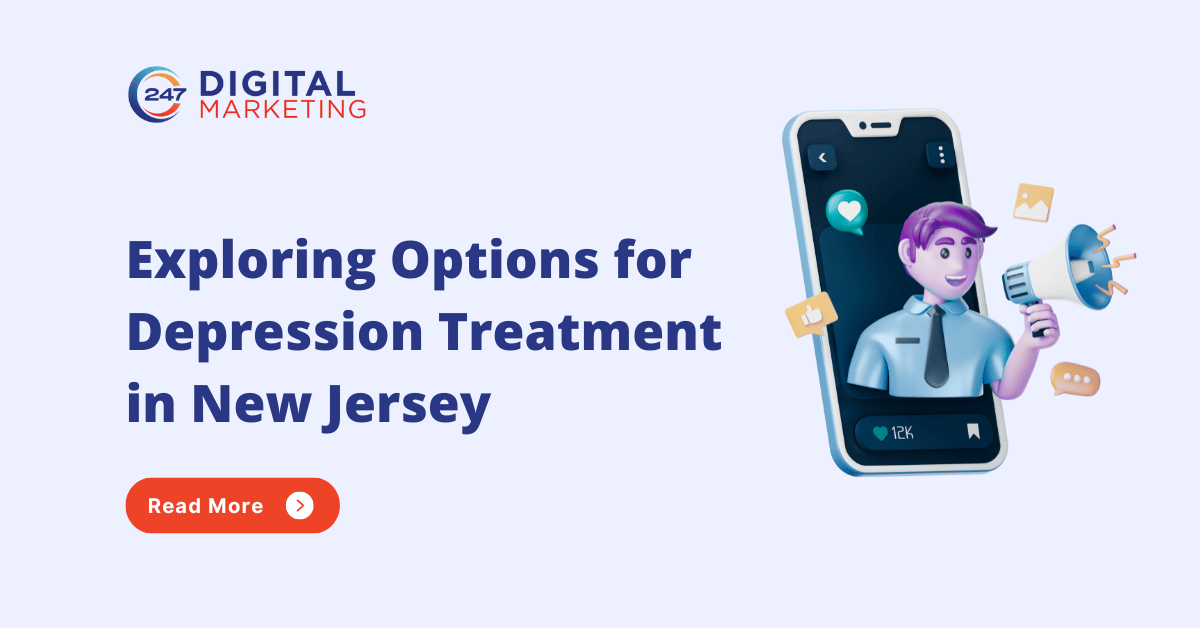
Depression remains one of the most common mental health challenges in the United States, affecting millions of people each year. While symptoms vary, they often include persistent sadness, fatigue, sleep disruptions, loss of interest, and difficulty concentrating, issues that can interfere with nearly every aspect of daily life. The good news is that effective treatment options are available, and for residents of the Garden State, there are diverse resources designed to meet individual needs.
This article explores the range of evidence-based approaches, the importance of personalized care, and what individuals can expect when seeking help locally.
The Importance of Seeking Professional Care
Depression is more than occasional sadness, it’s a condition rooted in both biological and psychological factors. Left untreated, it can worsen over time, impacting relationships, work performance, and even physical health. Some individuals may experience cycles of improvement and relapse, while others feel persistently weighed down by symptoms.
Seeking professional support early can prevent complications and improve long-term outcomes. In New Jersey, access to licensed psychiatrists, psychologists, and therapists is expanding, with clinics, hospitals, and private practices offering a variety of evidence-based therapies tailored to different needs.
Traditional and Modern Treatment Approaches
Treatment for depression often involves a combination of therapies tailored to the individual. The most common include:
- Psychotherapy: Approaches like cognitive-behavioral therapy (CBT), interpersonal therapy (IPT), and psychodynamic therapy can help patients identify negative thought patterns, improve coping skills, and strengthen relationships.
- Medication management: Antidepressants, such as SSRIs, SNRIs, or atypical medications, can regulate brain chemistry, but they require careful monitoring to balance benefits and side effects.
- Lifestyle interventions: Regular exercise, consistent sleep schedules, and nutritional adjustments play supportive roles in mood stabilization and resilience.
Alongside these standard approaches, newer options such as transcranial magnetic stimulation (TMS) and ketamine infusions are being introduced in specialized centers. These treatments may be particularly helpful for individuals who have not responded to traditional medications or talk therapy.
Local Resources and Accessibility
New Jersey offers a wide spectrum of care, from large hospital systems with comprehensive mental health departments to smaller community-based clinics. Accessibility is an important factor when choosing treatment, since consistency often determines success. Patients should consider not only the clinic’s location, but also its services, appointment availability, and insurance acceptance.
When exploring options for New Jersey depression treatment, it’s important to look at how different providers structure their programs. Some focus primarily on therapy, while others combine counseling with medication management or innovative approaches like TMS. Comparing these options helps patients find the right balance of services to fit their needs and circumstances.
Tailoring Treatment to the Individual
No two people experience depression in exactly the same way. Some may feel primarily low energy and sadness, while others struggle with irritability, disrupted sleep, or concentration issues. Because of this variability, individualized care is essential.
Effective treatment plans often combine multiple strategies, adjust medications over time, and integrate supportive services such as group therapy or family counseling. In New Jersey, many clinicians emphasize collaborative care, involving patients in the decision-making process and encouraging ongoing feedback. This patient-centered approach ensures that treatment addresses not just immediate symptoms, but also long-term recovery and quality of life.
Emerging Therapies and Community Support
One of the benefits of seeking care in New Jersey is access to emerging therapies and research-backed innovations. TMS therapy, for example, has become increasingly available for those with treatment-resistant depression, offering a non-invasive option with fewer systemic side effects than traditional medication. Ketamine therapy, another promising intervention, is being studied and applied in controlled clinical environments.
Beyond clinical treatment, community support also plays a vital role. Peer support groups, educational workshops, and nonprofit organizations across the state provide additional layers of connection. These resources can reduce isolation, encourage accountability, and create a sense of belonging, critical elements for sustaining recovery.
Navigating the First Steps
Beginning treatment can feel overwhelming, but breaking the process into smaller steps makes it more manageable:
- Initial assessment – Meet with a licensed mental health professional for a comprehensive evaluation.
- Diagnosis – Determine whether symptoms meet the criteria for depression or another mental health condition.
- Treatment planning – Collaborate with your provider to develop a personalized strategy, which may involve therapy, medication, or a combination of approaches.
- Regular follow-ups – Schedule consistent appointments to track progress, discuss challenges, and make necessary adjustments.
Taking that first step is often the hardest, but it’s also the most important in moving toward recovery.
Conclusion: Accessing Care Close to Home
Depression may feel isolating, but effective treatment is within reach. From psychotherapy and medication to innovative therapies like TMS, New Jersey offers a wide range of resources to support recovery. By exploring options, evaluating providers, and committing to a personalized plan, individuals can take meaningful steps toward renewed balance and hope.
Support is closer than you think, and with the right care, lasting change is possible.
Mitesh Patel is the co-founder of 247 Digital Marketing, LawFirm Marketing and a columnist. He helps companies like Emerson and other top Fortune 500 compnies to grow their revenue.



